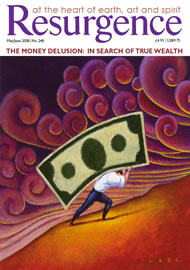A SIBERIAN WOMAN who is fighting to protect the world’s oldest fresh-
water lake from nuclear pollution has been awarded the 2008 Goldman Environmental Prize, also known as the ‘Green Nobel Prize’.
Marina Rikhvanova is one of six global recipients of the Goldman Prize, which has been awarded for her continuing fight to protect Lake Baikal, the world’s oldest and deepest lake. Widely known as the ‘Galapagos of Russia’, Lake Baikal, in Siberia, has one of the world’s richest and most unusual collections of freshwater biodiversity, and is home to more than 2,000 endemic plant and animal species. With more than 20% of the world’s freshwater reserve, it is the largest lake in the world.
But Lake Baikal and the people living in the Baikal region are under threat from nuclear contamination. The Russian government plans to build a new uranium cleaning and storage plant – the International Uranium Enrichment Centre – just fifty miles from Lake Baikal and within the lake’s watershed. Working with Siberian NGO Baikal Environmental Wave, Rikhvanova has been campaigning against the government in a bid to save Lake Baikal from nuclear pollution and to protect local communities from radioactive waste.
Nuclear contamination is Russia’s biggest pollution problem. The Russian government is the only country in the world which accepts radio-active waste from other countries for processing, long-term storage and burial – Russia is paid to take up to 90% of the nuclear waste of other nations such as Japan and Iran which do not want to deal with it. More than half a million tons of radioactive waste are already stored at an existing nuclear plant on the proposed Uranium Enrichment Centre site in Angarsk. Backed by the US government, the new Uranium Enrichment Centre would process, produce and store more than four times the amount of uranium than is currently being processed there.
Rikhvanova wants this to stop. She has been leading calls for the Russian government to halt construction of the Uranium Enrichment Centre and protect Lake Baikal, the local environment and local communities. She has organised mass demonstrations and rallies in the Baikal region, with over 20,000 people signing a petition objecting to the project. For her pains she has been singled out for harassment and intimidation. On the day of her first protest camp, her apartment was raided and her computer was confiscated by the Russian authorities; at another protest camp organised by anti-fascist protesters, participants were attacked and one person was killed. But the campaign goes on, and the Goldman Prize will now help to highlight its crucial work. PK
For further information visit






